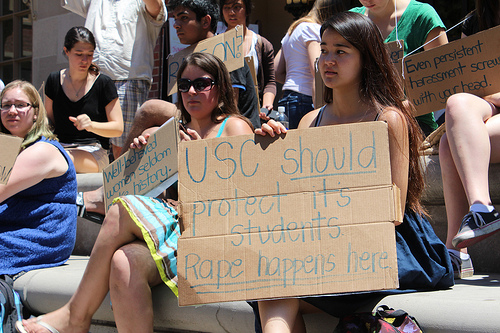A Timeline Of Sexual Assault At USC

But this is not the first time USC has been criticized for its policies toward rape and sexual assault on its campus.
READ MORE: Sexual assault at USC.
National standards for reporting rape and sexual assault changed with the federal Clery Act, which requires any college or university that receives government education funding to report accurate information about crime on their campuses.
Included is a brief timeline of rape and sexual assault issues that have affected USC over the past two decades.
Initial Problems with Disciplining Sexual Assault
April 28, 1990: USC and L.A. police began investigating the alleged rape of a sorority member by someone of the Alpha Tau Omega (ATO) fraternity. The incident was the fourth report of date rape that school year, but it was the only case filed with the police. In the three previous cases, the USC panel responsible for holding disciplinary reviews did not find the suspects guilty of rape. For the fourth incident, prosecutors did not find sufficient evidence to charge the ATO member with rape, which led the woman to file a civil lawsuit. The woman's family members complained there was a conflict of interest for a top police official, who was a USC alumnus, which the official and USC denied.
June 3, 1992: A committee of experts appointed by USC claimed the university was deficient in both preventing and investigating rape. A report put out by the committee said USC's system at the time left "rape victims feeling unsupported." USC's vice president for student affairs at the time, James M. Dennis, said many of the recommendations made in the report were "simply fine-tuning existing policies" while others would require further review.
USC Found to Have Clery Violations
January 2007: The state auditor gave USC suggestions to help align its policies with the Clery Act requirements, and in 2008, USC was reevaluated to determine the extent to which the university had improved its crime data. The status of each problem, as of Feb. 2009, is shown in bold below. A California State Auditor Report found USC in failure of:
- Correctly classifying specific incidents of potentially reportable crimes; Pending.
- Collecting enough information from campus security and local police agencies; Partial corrective action taken.
- Having adequate procedures for identifying reportable locations; Partial corrective action taken.
- Having the same statistics in its report to the Department of Education as in its annual security reports; Corrective action taken.
- Disclosing campus security policies per Clery Act requirements; Corrective action taken.
- And establishing all the policies or procedures described in its annual report. Partial corrective action taken.
Recent Criticisms and Investigation of Current Policy
May 22, 2013: Sixteen women filed a Title IX complaint against USC for the alleged mishandling of rape and sexual assault cases. The same day, attorney Gloria Allred announced similar complaints at UC Berkeley, Swarthmore College and Dartmouth College.
July 22, 2013: Of the 16 plaintiffs who filed the Title IX complaint, three cases led the U.S. Department of Education’s Office for Civil Rights (OCR) to launch a federal investigation into USC’s policies regarding sexual assault. The three alleged victims — Tucker Reed, Alexa Schwartz and Ari Mostov — publicly announced the investigation and described their individual accounts of mistreatment to reporters.
July 26, 2013: USC Provost Elizabeth Garrett writes a letter to the USC community addressing what she called “misreporting about the scope and basis of the OCR inquiry.” In the letter, Garett also called USC a “national leader” in dealing with sexual violence and harassment.
August 10-11, 2013: Reed, one of the three women whose cases led the federal investigation, organized a Clery complaint with Mostov and other students, alleging USC violated the Clery Act by misreporting and incorrectly dealing with sexual assaults.
September 15, 2013: A USC alumna opened up to HuffPost about her reported sexual assult 20 years ago and drew similarities between the school's handling of her case then to the accusations of mishandling in recent months. According to the woman, who asked to remain anonymous, USC officials delayed her report of the incident, were dismissive, got facts from her case wrong and gave the accused suspect a lesser charge.
October 1, 2013: Due to the government shutdown, most of the OCR's staff was furloughed, putting the investigation of USC on hold indefinitely.
USC Officials Admit Fault in Mishandled Rape Cases
October 7, 2013: USC officials indicated they had underreported the number of sexual assaults for 2010 and 2011, the L.A. Times reported. During those years, USC officials supposedly did not report 13 cases of sexual assault. If true, it could cost the university a $35,000 fine for each unreported sexual assault, for a possible maximum of $455,000.
October 8, 2013: USC's Department of Public Safety (DPS) responded to news stories and criticisms about its underreported numbers. "We all agreed this would be misinterpreted and could raise some eyebrows, but we were trying to do the right thing and decdided to self-publish," said Deputy Chief David Carlisle. He said the underreporting occurred because DPS failed to account for sexual assaults reported to USC's Center for Women and Men, a counseling center on campus.
Read more of Neon Tommy's coverage of sexual assault at USC here.
Reach Staff Reporter Sophia Li here.



